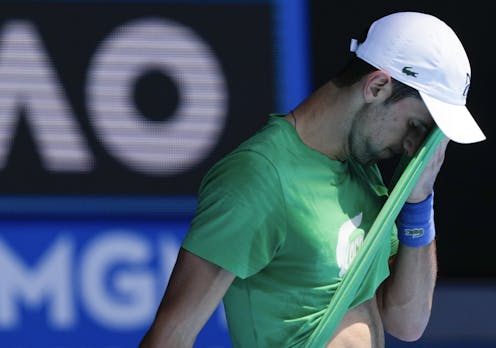Novak Djokovic's visa cancelled 'in the public interest', with possible 3-year ban from Australia
- Written by Michelle Grattan, Professorial Fellow, University of Canberra

Immigration Minister Alex Hawke announced late Friday he had cancelled tennis star Novak Djokovic’s visa “on health and good order grounds, on the basis that it was in the public interest to do so”.
Djokovic’s lawyers immediately went to court to seek an injunction against his deportation.
The government had delayed all week responding to the Federal Circuit Court’s Monday quashing of the original decision by Border Force officials to cancel the Serbian player’s visa when he arrived in Australia.
The delay was partly due to extensive material provided by Djokovic’s laywers. But also, after being humiliated by the overturning of the initial visa cancellation, the government was anxious to make sure Hawke’s action would withstand a fresh challenge.
There has been strong public reaction against Djokovic, which has also been a factor in the government’s thinking. But at a diplomatic level, Serbia reacted sharply against the initial cancellation of his visa.
Djokovic was seeking a tenth title at the Australian Open, which starts on Monday. The draw pitted him against a fellow Serbian player in the first round.
Hawke said in his Friday night statement: “The Morrison government is firmly committed to protecting Australia’s borders, particularly in relation to the COVID-19 pandemic”.
Djokovic, who is unvaccinated, obtained a medical exemption under a Tennis Australia and Victorian government process on the grounds he had tested positive for COVID last month and therefore did not need to be vaccinated. But this was not accepted by the federal government.
Hawke said: “In making this decision, I carefully considered information provided to me by the Department of Home Affairs, the Australian Border Force and Mr Djokovic”.
Prime Minister Scott Morrison also released a statement expressing support for Hawke’s decision.
“This pandemic has been incredibly difficult for every Australian but we have stuck together and saved lives and livelihoods,” he said.
“Australians have made many sacrifices during this pandemic, and they rightly expect the result of those sacrifices to be protected,” he added. “This is what the minister is doing in taking this action today.”
The federal government conceded in Monday’s court case that Djokovic had not received procedural fairness when he was interviewed at Melbourne’s airport upon arrival. The interview took place in the early hours on January 6, which meant he did not have the opportunity to contact advisers.
But while Border Force has come under criticism within the government over its handling of the matter, Hawke said pointedly in his statement, “I thank the officers of the Department of Home Affairs and the Australian Border Force who work every day to serve Australia’s interests in increasingly challenging operational environments.”
The immigration minister has broad discretionary powers under section 133C (3) of the Migration Act[1] to cancel visas on public interest grounds, including on the grounds of health, safety or good order.
Read more: Why one man with 'god-like' powers decides if Novak Djokovic can stay or go[2]
Following Hawke’s decision, the law dictates that Djokovic will not be able to be granted another visa for three years, except in certain circumstances. These include compelling circumstances that affect the interests of Australia or compassionate or compelling circumstances affecting the interests of an Australian citizen, permanent resident or eligible New Zealand citizen.
Hawke did not address whether Djokovic was likely to be able to obtain a visa before the end of the three-year period.
References
- ^ section 133C (3) of the Migration Act (classic.austlii.edu.au)
- ^ Why one man with 'god-like' powers decides if Novak Djokovic can stay or go (theconversation.com)

















